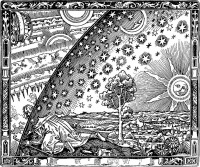Astronomy
From The Art and Popular Culture Encyclopedia

Illustration: Flammarion engraving, a wood engraving by an unknown artist, so named because its first documented appearance is in Camille Flammarion's 1888 book L'atmosphère: météorologie populaire ("The Atmosphere: Popular Meteorology").
|
Related e |
|
Featured: |
Astronomy is a natural science that is the study of celestial objects (such as moons, planets, stars, nebulae, and galaxies), the physics, chemistry, mathematics, and evolution of such objects, and phenomena that originate outside the atmosphere of Earth. A related but distinct subject, cosmology, is concerned with studying the universe as a whole.
Astronomy is one of the oldest sciences. Prehistoric cultures have left astronomical artifacts such as the Egyptian monuments and Nubian monuments, and early civilizations such as the Babylonians, Greeks, Chinese, Indians, Iranians and Maya performed methodical observations of the night sky. However, the invention of the telescope was required before astronomy was able to develop into a modern science. Historically, astronomy has included disciplines as diverse as astrometry, celestial navigation, observational astronomy, and the making of calendars, but professional astronomy is nowadays often considered to be synonymous with astrophysics.
Early history
Early cultures identified celestial objects with gods and spirits. They related these objects (and their movements) to phenomena such as rain, drought, seasons, and tides. It is generally believed that the first astronomers were priests, and that they understood celestial objects and events to be manifestations of the divine, hence early astronomy's connection to what is now called astrology. Ancient structures with possibly astronomical alignments (such as Stonehenge) probably fulfilled astronomical, religious, and social functions.
Calendars of the world have often been set by observations of the Sun and Moon (marking the day, month and year), and were important to agricultural societies, in which the harvest depended on planting at the correct time of year, and for which the nearly full moon was the only lighting for night-time travel into city markets.
The common modern calendar is based on the Roman calendar. Although originally a lunar calendar, it broke the traditional link of the month to the phases of the moon and divided the year into twelve almost-equal months, that mostly alternated between thirty and thirty-one days. Julius Caesar instigated calendar reform in 46 BCE and introduced what is now called the Julian calendar, based upon the 365 1⁄4 day year length originally proposed by the 4th century BCE Greek astronomer Callippus.
See also
- Constellation
- Cosmogony
- Cosmology
- E pur si muove!
- Galileo Galilei
- Heliocentric model
- Solar System
- Space exploration
- Space science
- Star
- Telescope



